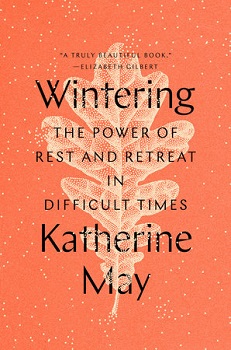Wintering: The Power of Rest and Retreat in Difficult Times by Katherine May
Life is full of times when events may cause us to drop out of the flow for a time. These fallow periods, often unexpected, can contribute to feeling isolated, frozen and cut off from others. Sounds a lot like 2020, doesn’t it?
Katherine May writes about these times, and the inherent power in them, in her incredibly timely recent book Wintering: The Power of Rest and Retreat in Difficult Times. Published in early November in the United States, Wintering is both a guidebook and a consolation for those who find themselves living through a personal winter.
May’s interest in “wintering” began around the time of her her 40th birthday, when a series of domino effect events turned her life upside down. Her husband suddenly fell gravely ill, May suffered personal health issues that grew impossible to ignore, she left her job, and her son had to be pulled out of school for anxiety issues.
In an interview, May says her “sense of mortality and fragility really hit” during this time, and that she was further discomfited by the way these events made her feel like a social pariah. Her immediate reaction was to try to deny or delay the winter that was happening in her life. But she came to see that this stance put her in a perpetual state of flight, and that it was better to learn how to accept and embrace this season as a normal part of life, living through it deliberately and knowingly.
A friend from Northern Finland had much to teach May about wintering from Finnish culture, where winters are long and must be prepared for very intentionally. In July, Finns begin gathering and drying mushrooms, canning, pickling and baking so that they will have foodstuffs to provide comfort and nourishment and also to offer hospitality to others during the long dark and cold season.
Other research took May to Stonehenge for ceremonies on the day of the Winter Solstice, to Iceland to swim in the Blue Lagoon, and to the Arctic Circle in Norway in search of the Northern Lights. In these places, she came to realize that cold has a healing power (besides putting ice on injuries); the danger of cold forces us into the moment, where we must pay attention to our bodies and attend to immediate needs in order to keep safe.
Are you someone who often wakes in the middle of the night only to spend time catastrophizing? Waking in the middle of the night is usually associated with anxiety, but May discovered that sleep was very different for pre-industrial revolution people, where “two sleeps” was completely common. Pre-electricity, people went to bed earlier, then woke after several hours. This waking time was expected, and was a calm time often filled with contemplation, prayer, meditation, quiet conversation or even enjoying a smoke.
May began simply getting up when she woke in the middle of the night and found that the anxiety formerly associated with her sleeplessness drained away when she did so.
Like the actual season of winter, May advises that we emerge slowly from our personal winters, giving ourselves time to adjust to how we need to do things now, incorporating all the ways that winter has changed us. This feels like an especially important reminder as we go into a new year—one that we hope will restore “normal” activities.
May warns that there may be anxiety in places that used to feel comfortable and that some of the emotions and feelings from 2020 might only release when the danger has passed. We should be prepared to give and take time, listen deeply to each other, and extend compassion. Thankfully, the cycle of the seasons reassures us that spring does follow winter and Wintering teaches what we can do to prepare for the winters that will inevitably befall us in the future.
Lisa Gresham is the Collection Services Manager at Whatcom County Library System. Visit https://www.wcls.org to place holds on library materials and learn about curbside holds pick up and other library services.
(Originally published in Cascadia Weekly, Wednesday, January 13, 2021.)

